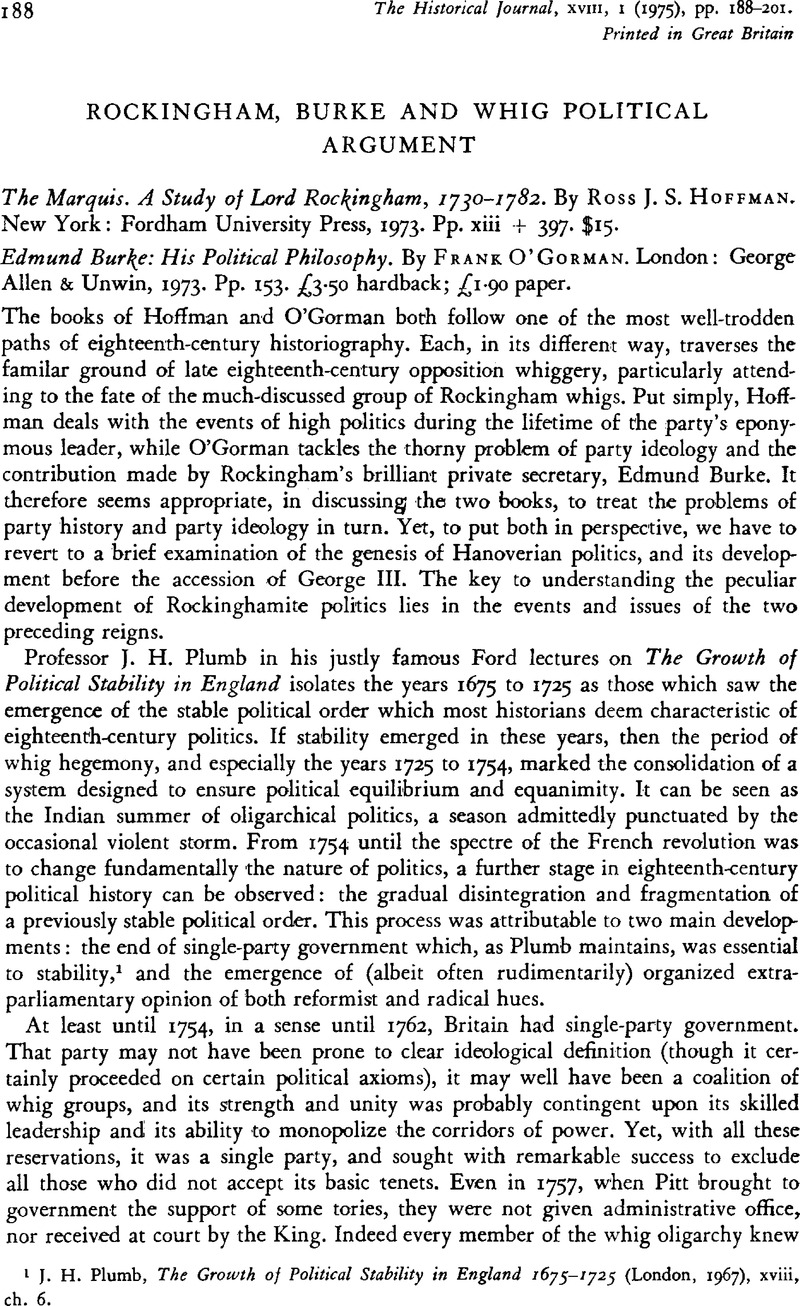Article contents
Rockingham, Burke and Whig Political Argument
Published online by Cambridge University Press: 11 February 2009
Abstract

- Type
- Review Articles
- Information
- Copyright
- Copyright © Cambridge University Press 1975
References
1 Plumb, J. H., The Growth of Political Stability in England 1675–1725 (London, 1967), xviii, ch. 6.CrossRefGoogle Scholar
2 See, inter alia, Bute's remarks about Newcastle and the fact that he could no longer “tip the Rascal and the Jacobite to every man that opposed Him”. (Bute to George [Grenville], [13 October 1761], Bute MSS 1761/738). I wish to acknowledge the kind permission of the Marquis of Bute to cite from his manuscript collection at Mount Stuart. For fuller substantiation of this point and those made in the preceding paragraph see Brewer, John, Political Argument and Propaganda in England, 1760–1770 (Cambridge University, Unpub., Ph.D., 1973), ch. 1.Google Scholar
3 Duchess of Newcastle to Newcastle, 14 November 1760, Nottingham University Library, Newcastle (Clumber) MSS 19/74; Devonshire Diary, 5 Apr. 1762, Devonshire MSS 260/370. I wish to acknowledge the kind permission of the Duke of Devonshire to cite from the Chatsworth manuscripts.
4 See Mordaunt's remark to Newdigate of 4 Dec. 1760: ‘tho’ you will be too late to make any Alteration in the Civil List, if you design'd any, you may yet be in Time to take some of it to your Share’. (Warwick R.O., Newdigate MSS B 18/1893). Cf. Rigby to Bedford, 24 Nov. 1762, Bedford MSS XLVI f. 128. I wish to acknowledge the gracious permission of the Duke of Bedford to cite from his manuscripts deposited in the London Bedford Office.
5 Namier, L. B., England in the Age of the American Revolution (2nd ed., London, 1963), p. 185.Google Scholar
6 See his remark to Thomas Walpole: “being out Toried by Lord Bute [the] D[uke] of Newcastle] he had nobody to converse with but the Clerk of the H[ouse] of Commons”. (Devonshire Diary, 14 Nov. 1762, Devonshire MSS 260/394).
7 For an interesting discussion of this phenomenon, see Plumb, J. H. ‘political Man’, in Clifford, J. L. (ed.), Man versus Society in Eighteenth-Century England (Cambridge, 1968), pp. 1–21.Google Scholar
8 Winstanley, D. A., Personal and Party Government (Cambridge, 1910)Google Scholar; Lord Chatham and the Whig Opposition (Cambridge, 1912).Google Scholar
9 Oxford, 1973.
10 Newcastle to Mansfield, 21 Dec. 1767, British Museum Add.MSS 32,987 S. 363–4; Hurdis to West, 16 Jan. 1768, B.M.Add.MSS 32,988 f. 23.
11 For a detailed discussion of this conflict see Brewer, , Political Argument, pp. 122–46.Google Scholar
12 Foord, Archibald S., His Majesty's Opposition 1714–1830 (Oxford, 1964), p. 150.Google Scholar
13 I appreciate that the emphasis here is placed rather more strongly on Burke's novelty than in my ‘Party and the Double Cabinet: Two Facets of Burke's Thoughts’, Historical Journal xiv (1971) 479–501.Google Scholar
14 The Works of Edmund Burke (8 vols, Bohn's British Classics, London, 1854–1889), 1, 318.Google Scholar
15 Burke to Rockingham, 30 July 1769, Copeland, T. W. et al. (ed.), The Correspondence of Edmund Burke (9 vols, Cambridge, 1958–1970), II, 51–2.Google Scholar
16 Draft Speech, n.d., Sheffield City Library, Wentworth Woodhouse Muniments, Burke MSS 8 B. I am indebted to the Earl Fitzwilliam, Earl Fitzwilliam's Estates Company and the Sheffield City Library for permission to use these manuscripts.
17 The spectrum is well represented in Burke to Richmond (post 8 May 1780), Burke Correspondence, iv, 235–8.Google Scholar
18 Burke, to Shackleton, Richard (ante 15 Aug. 1770), Burke Correspondence, II, 150.Google Scholar
19 Pocock, J. G. A., Politics, Language and Time. Essays on Political Thought & History (London, 1972), p. 225.Google Scholar
20 The question of whether or not the speech was delivered is very tricky. There is no record, as Pocock remarks (ibid. p. 225), of a speech made by Burke on 7 May. He did, however, speak to Sawbridge's motion on shorter parliaments on 17 May “upwards of an hour”, and there referred to the fact that “on a former day” he had “spoken upwards of three hours on the subject” of parliamentary reform (Parliamentary Register, VII, 183)Google Scholar. It may be, therefore, that Burke did speak on 7 May, but that his words went unrecorded. Moreover, Sheridan's description of Burke's speech on 17 May (Russell, Lord John (ed.). Memorials and Correspondence of Charles lames Fox (4 vols, London, 1853–1957), I 322)Google Scholar: he ‘swore Parliament was and always had been precisely what it ought to be, and that all people who thought of reforming it wanted to overturn the constitution’, sounds very much like a précis of the speech printed in Burke's Works (Works, vi, 144–53). I find it very hard to believe that Burke did not use at least a substantial part of his speech during the debate of either 7 or 17 May.
21 Pocock, , Politics, Language and Time, pp. 225–7.Google Scholar
22 For which see Pocock, , Politics, Language and Time, pp. 202–32Google Scholar; Lucas, Paul, ‘On Edmund Burke's Doctrine of Prescription; or, An Appeal from the New to the Old Lawyers’, Historical Journal xi (1968), 35–63.CrossRefGoogle Scholar
- 4
- Cited by




